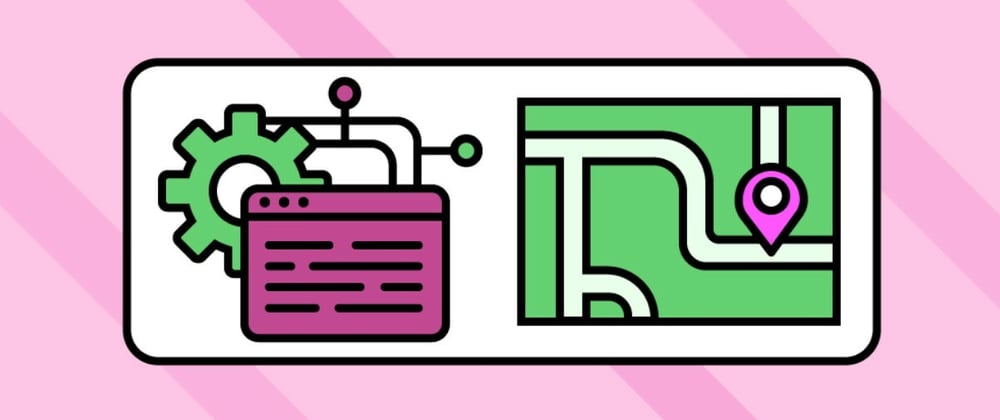Now is a great time to consider a career as a software engineer. Whether you're just starting professionally or thinking about making a career change, there are several good reasons to consider software engineering.
- The compensation is great
- The number of jobs is increasing
- Constantly evolving technology is giving software engineers new challenges to address, problems to solve, and specializations to pursue
As is the case when we pursue any new career path, the road to becoming a software engineer may appear long, challenging, or ambiguous. You'll need to do some research and soul-searching to understand where to start and which route to take. For this, we've prepared a roadmap to point you in the right direction.
As you embark on your journey, this roadmap will:
- Help you answer big questions about becoming a software engineer
- Offer structure
- Point you to resources for more information
Career paths inevitably vary from person to person. Some advice in this article may not apply to you, and some of the questions we'll present resist hard and fast answers. But in the end, we hope to take some guesswork out of the process.
Let's get started!
We'll cover:
- Steps to becoming a software engineer
- How long does it take to become a software engineer?
- Requirements to become a software engineer
- How much does a software engineer make?
- Next steps to becoming a software engineer
Steps to becoming a software engineer
Let's address one caveat: each person's journey into software engineering is unique. Previous education, training, and experience will vary from person to person, as will requirements from job to job.
The specialization you pursue will also shape your path. Today, there are many popular disciplines in software engineering:
- Front-end engineers focus on the user interface (UI) and client-side functionality of software applications. (Read more about front-end vs back-end development.)
- Back-end engineers specialize in applications' structure and server-side operations, including data management and internal systems.
- Full-stack engineers work on both the front-end and back-end of applications.
- Data engineers focus on transforming data to be easily digestible and available for analysis by data scientists.
- Machine learning (ML) engineers work on data science teams, designing and implementing programs and systems that can learn and make decisions on their own.
- Security engineers specialize in testing the security of systems, highlighting the flaws, and making improvements.
These roles require specific technical skills, which we'll talk about later. But most software engineering career paths share a few steps. Next, we'll review these steps and estimate how long most of them will take.
Step 1: Make a career plan
Your process will begin with research and planning. You can start figuring out how you want to arrive at your goal by asking yourself some questions:
- How do you want to get your education? Whether you pursue a computer science degree or take an alternate route, you'll need to learn new skills and information to become a software engineer. Debating between a coding bootcamp vs a computer science (CS) degree? Many employers still prefer candidates with at least a bachelor's degree in CS or a related field. But you don't necessarily need such a degree to get a job. In addition to bootcamps, other employment avenues include earning a college certificate or studying independently.
Heads up: Alternative, non-degree paths will generally prepare you for more junior roles, such as junior/associate software engineer or computer programmer, and may not be sufficient for specializations like data engineering and machine learning.
- What software engineering specializations interest you? In addition to the engineering roles we've already discussed, options include web development, DevOps, and computer systems.
Keep in mind: You can't really know whether you'll like a chosen specialization until you've tried it. So if you have doubts after picking a specialty, don't worry. Remember that software engineering roles share many basic competencies, and you can always adjust your route later.
We can't estimate how long this process will take for you. You'll want to do your due diligence while researching and planning. The decisions you make will determine how the rest of your roadmap unfolds, starting with the next step of the process: getting an education.
Step 2: Get an education
As we mentioned, you can enter a degree program in computer science or pursue an alternate path. Either way, educating yourself is crucial. Let's compare the pros and cons of some of the options by checking out the original link below!
Visit the original article on Educative to view a chart comparing the advantages and disadvantages of different forms of coding education!
Time estimate: Finishing your education could take 12 weeks to six years, excluding the time it takes to apply for and wait to begin a program.
Step 3: Get real-world experience
Employers generally want to hire software engineers who have proven experience in the field, so this step might seem to present a problem. How do you get your first real-world exposure if you need experience to get a job?
Fortunately, there are ways to gain valuable practice that will help you stand out to employers and get that first software engineering job.
- Complete an internship
- Participate in hackathons
- Complete personal coding projects, including work on open-source projects
If you're working toward a degree or bootcamp certificate, your program should be able to help you find these kinds of opportunities. If you're studying on your own, you will have to be proactive. Start learning about:
- Building your brand
- Perfecting your resume
- Planning coding projects
- Contributing to open-source projects
Be sure to preserve your work on the real-world projects you complete. This will become especially important down the road as you prepare to look for jobs!
Time estimate: Plan on spending at least a few months getting this experience, though some of these pursuits could happen alongside your education.
Step 4: Earn a certification (optional)
Completing a certification will help you stand out to potential employers. Some certification providers expect previous professional experience in the field, so you might need to wait to complete this step until later in your journey.
Some well-known certifications include:
- Certified Secure Software Lifecycle Professional
- Professional Software Developer
- C/C++ Certified Professional Programmer
- Microsoft certifications
- AWS certifications
Time estimate: You might need multiple years to gain the requisite experience before you pursue certification. You'll also need to plan time to study for an exam, which will vary by credential.
Step 5: Prepare for your job search
Your job search will be a lot more fruitful if you start well-prepared. Before you apply, consider the following actions:
- Build a portfolio of projects: Complete individual coding projects on your own time or volunteer on open-source software projects. Create a free account on GitHub and maintain your code in repositories there. (Bonus: you'll learn version control in the process!)
- Prepare for interviews: Practice solving coding problems, study common software engineering interview questions, and don't forget about behavioral interview questions involving soft skills.
- Network: Use LinkedIn groups, school alumni networks, and other tools to connect with other software engineers and companies you're targeting.
Time estimate: This preparation might require a few weeks to a few months.
Step 6: Search for software engineer jobs
You've come a long way, and it's time to begin your job search. Use online resources like Indeed, Glassdoor, Dice, ZipRecruiter, etc., to research and apply for open positions. Keep track of your applications in a spreadsheet or other document.
Time estimate: Your circumstances will dictate how long your job search takes. Anticipate at least a month or two of applying and interviewing even if employers respond to your applications quickly. If you hear back from a software company, expect multiple rounds of interviews over about four to six weeks. But try to stay positive if you don't get an interview or job offer right away. Experiencing rejection before landing a role is common, and your interviewing skills will improve with practice.
How long does it take to become a software engineer?
It can take anywhere from three months to six years to become a software engineer, depending on factors that include:
- Your existing technical skills (e.g., what do you already know before starting your technical education?)
- Your work experience (e.g., how does your previous experience translate to software engineering?)
- Your previous education (e.g., if you have a degree, is it in a relevant discipline?)
- Your career goals (e.g., are you aiming for an entry-level position or something more senior?)
Suppose you already have some technical skills, experience, and a bachelor's degree in computer science or a related field. In that case, you might become a software engineer within a few months of beginning a job search. If you're on the other end of the spectrum, you might need several years to address gaps in education, experience, and skills and find a job in the industry.
Yes, that's an ambiguous answer. But as discussed earlier, we can be more definitive about how your education choices will affect your timeline.
Any post-education steps you take before applying for jobs will require additional time. Keep that in mind when planning your timeline for becoming a software engineer, along with various requirements you'll need to satisfy.
Requirements to become a software engineer
The requirements to become a software engineer vary based on previous experience, specializations, and career goals.
Education
Learning about software engineering is a must, as we mentioned earlier. Many employers prefer candidates with at least a bachelor's degree in computer science or a related field. But that CS degree is not a codified requirement per se, and you can still prove your proficiency by learning through certificate programs, bootcamps, and self-study.
Relevant experience
Additionally, many software engineer jobs require multiple years of hands-on experience for candidates even to be considered. The requirement will vary depending on the seniority of the role you're trying to land. Employers will expect far more experience in a senior software engineer candidate than a computer programmer applicant.
As we've discussed, you can build experience and boost your chances of success with:
- Internships: Completing these can provide valuable experience, boost your chances of landing future employment, and get your foot in the door with hiring companies.
- Professional certifications: While not a requirement, these can improve your competitiveness, signaling proficiency and dedication to potential employers.
Technical skills
Your education and professional experience will help equip your toolkit with technical skills. But you will likely need to continue to learn new skills on your own through books, videos, and online learning platforms.
To add, any software engineering specialization you pursue will require its own skills. Here are the six disciplines we defined earlier and some of the skills commonly expected of candidates.
Soft skills and qualities
Finally, certain intangible qualities will help you succeed in software engineering. While anyone can become a developer, these six characteristics are borderline requirements to become an outstanding engineer:
- A desire to build and create
- A team mindset
- Creative problem-solving skills
- Empathy
- Determination
- A love of learning
Employers will vet these skills through your communication in the interview process, and you should continue demonstrating them on the job to build your professional reputation.
How much does a software engineer make?
Like many best-paying jobs in tech, software engineering jobs can be lucrative. According to the Bureau of Labor Statistics (BLS), the median pay for software engineers in 2020 was $110,140 per year ($52.95 per hour). Because this is a median figure, your actual salary or wage could be higher or lower. But whatever level you start at, software engineering jobs have plenty of room for salary growth.
Another critical factor to consider is the demand for software engineers, as measured by the number of jobs available. The BLS projects that software engineering jobs will grow 22 percent from 2020 to 2030, much faster than the average for all occupations. For a less scientific approach, search for software engineer jobs on sites like Indeed, Glassdoor, Dice, ZipRecruiter, etc., to see what positions are available in your geographic area. Additionally, Glassdoor can estimate salaries for specific companies based on employees' anonymous reports.
Next steps to becoming a software engineer
By now, you should have a clearer idea of the steps to becoming a software engineer, how long it takes, the typical requirements, and how much you might earn. Hopefully, this knowledge has inspired you! Now it's time to get to work, starting with making a career plan.
Once you've drafted a plan, the next step is to dive into learning. Regardless of how you pursue your education, you'll be picking up technical skills. To help you with this, Educative offers interactive software development instruction for learners at all levels.
If you're just starting, learning a programming language will be worthwhile, and the versatility of Python makes it a great place to begin. Our free course Learn Python 3 from Scratch will give you a handle on this prevalent programming language. In it, you'll explore the building blocks of Python before moving on to higher-level concepts such as functions and loops. By the end of the course, you'll be able to create basic applications in Python 3.
Happy learning!
Continue learning about software engineering on Educative
Start a discussion
Why do you want to pursue a career in software engineering? Was this article helpful? Let us know in the comments below!


















Oldest comments (0)